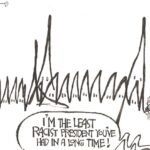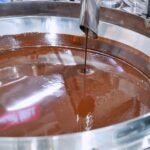No Brand Burger, a fast food hamburger chain owned by E-Mart
When South Korean convenience store operator E-Mart Inc. launched its low-budget house label No Brand in 2015, hardly anyone thought it would last long.
Under its motto, “at prices ultra cheap beyond common sense,” No Brand has since unveiled snacks, food and daily necessities even below half the usual prices found in other convenience stores in Korea.
A 110-gram No Brand potato chip, which began selling at 890 won (64 cents) in June 2015, bears the same price tag now.
Such an ultra-low-price strategy worked. The No Brand outlets have grown to 250, with the number of products rising to 1,500 from just nine over the years.
Having tasted success in Korea, E-Mart, a unit of Korean retail giant Shinsegae Inc., is now taking the business model abroad, intending to become something big like Trader Joe’s, a US grocery chain store operator, or Europe’s Aldi, a chain of low-budget retail stores.
E-Mart’s No Brand products
NO BRAND IN LAOS
According to industry sources on Friday, E-Mart will open a standalone No Brand outlet in Laos next month.
Just like Trader Joe’s or Aldi, the No Brand outlet, its first in Laos, will largely be filled with its own brand products.
E-Mart aims to raise the number of No Brand outlets to three by the end of this year and increase it further to 70 over the next decade.
In February, E-Mart signed a master franchise agreement with Kolao Group for its foray into the Laotian market.
E-Mart signs a master franchise agreement with Laos-based UDEE, an affiliate of Kolao Group
Under the agreement, E-Mart also plans to separately open its own stores – as many as 20 – within a decade.
Riding on the K-food popularity in Southeast Asia, E-Mart is already selling No Brand products at its stores in Vietnam and Mongolia.
For its business in Cambodia, E-Mart, via its affiliate E-Mart24 Inc., in December 2023 signed a master franchise agreement with Saihan Partners, a joint venture between Cambodia’s food and beverage conglomerate Saisons Brother Holding Co. and Korea’s Hanlim Architecture Group.
In the Philippines, E-Mart operates 19 stores that sell No Brand products.
E-Mart’s convenience store in Singapore
MERIENDA TIME
To appeal to the Filipinos, who enjoy the “merienda” time, when snacks or meals outside the traditional staples of breakfast, lunch or dinner are served, No Brand sells coffee and tea products in individual units instead of bunched bags.
In 2023, E-Mart’s No Brand product exports to the Philippines, Mongolia and Vietnam rose 35%, 27% and 59%, respectively, from the previous year.
“Our No Brand product prices are even lower than the K-food sold locally in those countries,” said an E-Mart official.
E-Mart’s No Brand products
E-Mart’s private label products, including those sold under the Molly’s brand, reached 37.4 billion won ($27 million) last year, up 37% from the year prior.
Industry officials are closely watching E-Mart’s aggressive launching of its No Brand products in overseas markets to see if the Korean retailer can replicate the success of Costco’s Kirkland – the success story of a retailer’s house brand going global.
Other Korean hypermarket operators such as Lotte Shopping’s Lotte Mart and Shinsegae’s Homeplus are trying to bring their house brand products overseas. Their brand awareness, however, is highly limited, they said.
By Sun A Lee
suna@hankyung.com
In-Soo Nam edited this article.














